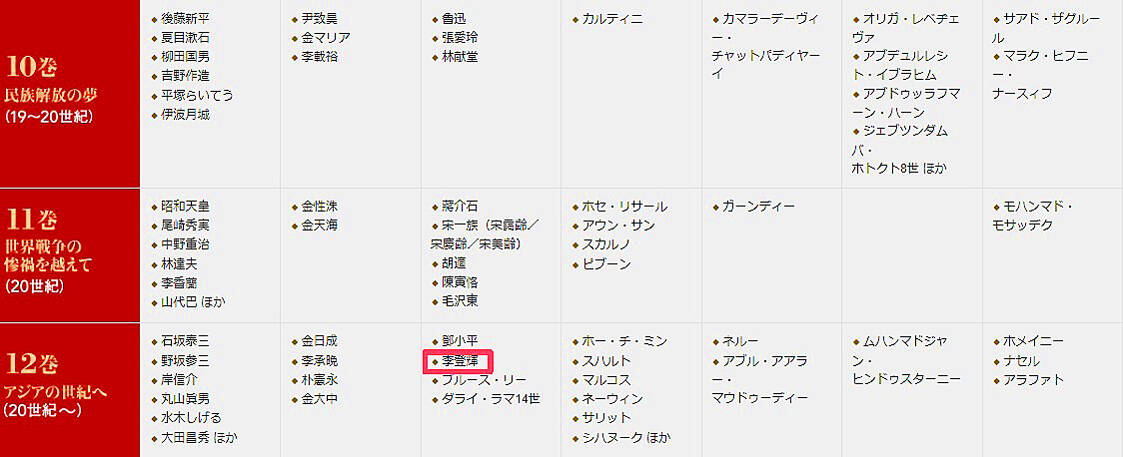A Taiwanese organization based in Tokyo on Sunday lodged a protest against Japanese publisher Shueisha for categorizing former president Lee Teng-hui (李登輝) under “China” in its collection on Asian figures.
To celebrate its 95th anniversary, the publisher is rolling out a 12-volume book featuring prominent Asian figures throughout history. The 12th volume is to be published in April next year. In it Lee is listed, along with former Chinese leader Deng Xiaoping (鄧小平), martial artist and actor Bruce Lee (李小龍) and Tibetan spiritual leader the Dalai Lama, under the category of China.
The All Japan Taiwanese Union in a statement said that Lee Teng-hui is deemed the “father of Taiwan’s democratization” and internationally is regarded as “Mr Democracy.”

Photo courtesy of the Lee Teng-hui Foundation
“To place him under the ‘China’ category is an obvious mistake,” the statement said, demanding that Shueisha correct the error.
In Taipei, Lee Teng-hui’s daughter, the chairwoman of the Lee Teng-hui Foundation, Annie Lee (李安妮), also issued a statement on Sunday, expressing regret that the Japanese publisher had listed her father under China.
“Lee Teng-hui is Taiwanese,” she said.
“Shueisha has a vast base of young readers, who will in the future be the pillars of Japanese society, hence the need to provide them with a correct understanding of history,” she said.
“All his life, my father, aside from striving for the democratization of Taiwan, cared deeply … [about] the relations between Taiwan and Japan, and had harbored strong expectations for Japan, hoping it would again have the confidence to lead Asia,” she said.
Japanese society is one that values character, facts and respect for humankind, Ann Lee said, adding that she hoped Shueisha would reconsider whether it was fitting to place Lee Teng-hui under the category of “China.”
She said she hoped that the collection would become a best-seller.

TRAFFIC SAFETY RULES: A positive result in a drug test would result in a two-year license suspension for the driver and vehicle, and a fine of up to NT$180,000 The Ministry of Transportation and Communications is to authorize police to conduct roadside saliva tests by the end of the year to deter people from driving while under the influence of narcotics, it said yesterday. The ministry last month unveiled a draft of amended regulations governing traffic safety rules and penalties, which included provisions empowering police to conduct mandatory saliva tests on drivers. While currently rules authorize police to use oral fluid testing kits for signs of drug use, they do not establish penalties for noncompliance or operating procedures for officers to follow, the ministry said. The proposed changes to the regulations require

The Executive Yuan yesterday announced that registration for a one-time universal NT$10,000 cash handout to help people in Taiwan survive US tariffs and inflation would start on Nov. 5, with payouts available as early as Nov. 12. Who is eligible for the handout? Registered Taiwanese nationals are eligible, including those born in Taiwan before April 30 next year with a birth certificate. Non-registered nationals with residence permits, foreign permanent residents and foreign spouses of Taiwanese citizens with residence permits also qualify for the handouts. For people who meet the eligibility requirements, but passed away between yesterday and April 30 next year, surviving family members

Taiwanese officials are courting podcasters and influencers aligned with US President Donald Trump as they grow more worried the US leader could undermine Taiwanese interests in talks with China, people familiar with the matter said. Trump has said Taiwan would likely be on the agenda when he is expected to meet Chinese President Xi Jinping (習近平) next week in a bid to resolve persistent trade tensions. China has asked the White House to officially declare it “opposes” Taiwanese independence, Bloomberg reported last month, a concession that would mark a major diplomatic win for Beijing. President William Lai (賴清德) and his top officials

The German city of Hamburg on Oct. 14 named a bridge “Kaohsiung-Brucke” after the Taiwanese city of Kaohsiung. The footbridge, formerly known as F566, is to the east of the Speicherstadt, the world’s largest warehouse district, and connects the Dar-es-Salaam-Platz to the Brooktorpromenade near the Port of Hamburg on the Elbe River. Timo Fischer, a Free Democratic Party member of the Hamburg-Mitte District Assembly, in May last year proposed the name change with support from members of the Social Democratic Party and the Christian Democratic Union. Kaohsiung and Hamburg in 1999 inked a sister city agreement, but despite more than a quarter-century of